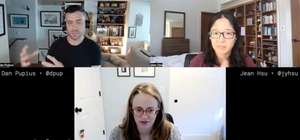In Season 2, Episode 3 of Lead Time Chats, Jean Hsu, VP of Engineering at Range, talks to Kim Scott, author of Radical Candor and Just Work, about privilege and the importance of building for systemic justice.
Kim and Jean discuss:
- The three revelations that led Kim down the path of working on Just Work
- The importance of intentionally building for systemic justice
- Recognition of the role of privilege in how Radical Candor is practiced and received.
- Using “You” statements such as “You can’t talk to me like that” in response to bullying (and also how to respond to prejudice and bias)
- Using Hollaback’s 5 D’s of Bystander Intervention: Distract, Delegate, Document, Delay, and Direct
Additional resources:
- Just Work: How to Root Out Bias, Prejudice, and Bullying to Build a Kick-Ass Culture of Inclusivity by Kim Scott
Takeaways from Kim
The three revelations that led Kim to Just Work
“When I gave a presentation at a tech company in San Francisco and the CEO of that company had been a colleague of mine for the better part of a decade. Somebody I really liked and respected enormously, and one of too few black women in tech. And she pulled me aside after I gave the Radical Candor talk and she said, "Look Kim, I'm really excited to roll these ideas out on the team. I think it's going to help me build the kind of culture I want," but she said, "I got to tell you it's a lot harder for me to roll this out than it is for you." And she explained that when she gave even the most compassionate, gentle candor that she would get signed with the angry black woman stereotype. And I knew this was true and it made me have sort of three revelations at the same time.
The first was that I had failed to be the kind of upstander, the kind of colleague for her that I wanted to be. I had failed to notice over our many years of working together that she always showed up invariably pleasant and you know, believe me, she had what to be pissed off about that period of time. And it had never occurred to me the toll that it must take on her to, to have to show up that way at all times. So that was number one.
Number two was her words made me realize that not only was it easier for me to roll out Radical Candor than for her. It was more difficult for me to roll out my own ideas than it was for the men who I worked with. And so I had been sort of in denial about the things that were happening to me as a woman in the workplace throughout my career, a hard thing for the author of a book called Radical Candor to admit.
And then last but not least, it made me realize that I had often failed to be the kind of leader that I imagined myself to be, that I wanted to be.”
If you don't build for systemic justice, you'll end up with systemic injustice.
“It's really important when you start a company, especially if you're a founder of a company, but when you're a leader of any sort to realize that you weren't designing these systems that are going to impact how people behave. And if you don't design the systems specifically for justice, you're going to wind up with systemic injustice.”
Leaders must create clear consequences for unacceptable behavior.
“I was at one point in my career, the CEO and founder of a software company. And there was a guy who was working for me who was struggling with a project . And so I was having a conversation with him about it. And at one point in the conversation, I said, as I always try to do, "What can I do or stop doing that would help you get this project back on track?"
And he kind of leans in and he says to me, "You are the most aggressive woman I ever met. That is the problem." So, you know, we're in an aggressive industry and part of his job is dealing with aggressive people. And if I'm the most aggressive woman that he ever met, I'm not even on the list of the top 100.
So his problem is not really my aggression. His problem is my gender. And in my case, that's not going to change. So, what I should have done in the moment was to create consequence for his behavior. That was my job as a leader is to create a consequence. But instead I responded as though I were the person harmed, and I sort of chose to ignore basically.
The problem with that was that if he was going to treat me that way, how was he going to treat the women on the team who worked for him, who were junior to him? And I got the answer to that question, unfortunately, a few weeks later.”
Respond to bullying with active You statements
“With bullying, you want a "You" statement. "You can't talk to me like that." And my daughter explained this to me. She was getting bullied. She was in third grade, she was getting bullied on the playground. And I was sort of encouraging her to use an "I" statement as adults often do to kids. And I said, why didn't you tell this kid, you know, I feel sad when you, blah, blah, blah, blah, blah.
And she bangs her fist on the table and she said, "Mom, he is trying to make me feel sad. Why would I tell him he succeeded?" And I thought, gosh, that is a really good point.
And so with, with bullying, you want to have the other person answering your questions or responding to you. You want to be in the active role, not the passive role.”
Enjoy Lead Time Chats?
Please leave us a rating or review on iTunes! It'll help these chats get in front of more engineers and leaders like yourself.
Don't miss any episodes!
- Subscribe to the Lead Time Chats podcast on Apple, Spotify, or wherever you listen to podcasts, so you don’t miss any episodes.
- Join Lead Time Community, where we'll post new Season 2 episodes weekly. Lead Time Community is a place to connect, share, and grow with other engineering leaders.
About Lead Time Chats
Listen in on unscripted conversations between Jean Hsu, VP of Engineering at Range and engineering leadership coach, and engineering leaders and other influential folks in tech.
Lead Time Chats is brought to you by Range. Range helps hybrid teams check-in asynchronously about what matters most. Know what's happening through status updates that pull from tools like Github and JIRA without scheduling yet another meeting.
Checking-in with Range creates more focus time for heads-down work, all while feeling a deeper sense of connection and belonging with your team. To learn more about Range, you can check it out here.
Season 2 Episodes
» Episode 1: Camille Fournier on making boring plans
» Episode 2: Tess Rinearson on early career engineering managers
» Episode 3: Kim Scott on building for systemic justice
Season 1 Episodes
» Episode 1: Will Larson on the path of the senior engineer
» Episode 2: Duretti Hirpa on mentoring junior and mid-level engineers
» Episode 3: Cate Huston on working with an external coach
» Episode 4: Juan Pablo Buriticá on common eng manager mistakes
» Episode 5: Gergely Orosz on the decision to go into management
» Episode 6: Lara Hogan on leading effectively in a pandemic
» Episode 7: Kaya Thomas on common early career engineer challenges
» Episode 8: Uma Chingunde on starting a VPE role in a pandemic
» Episode 9: Katie Wilde on supporting your team's mental health
» Episode 10: Akhil Gupta on navigating uncertainty in new roles
» Episode 11: Harper Reed on giving everyone a voice in team meetings
» Episode 12: Marc Hedlund on sponsorship








